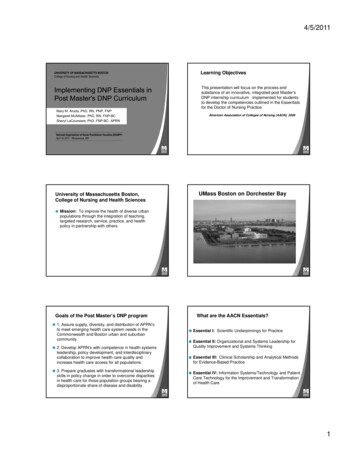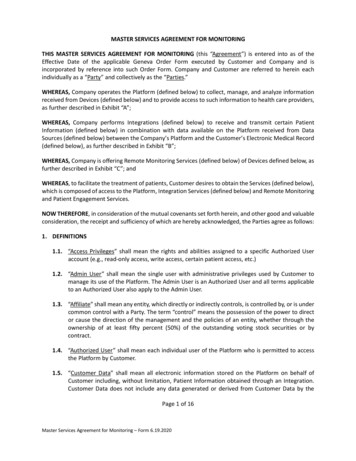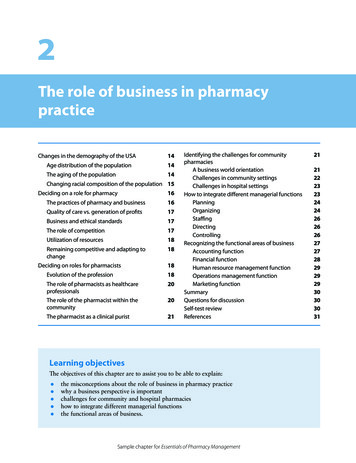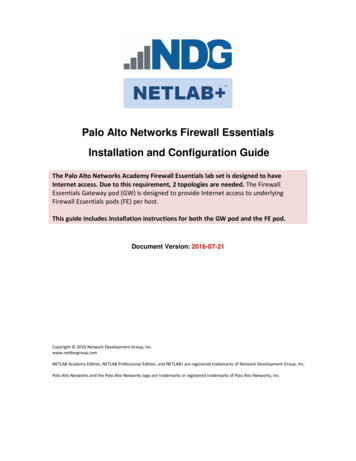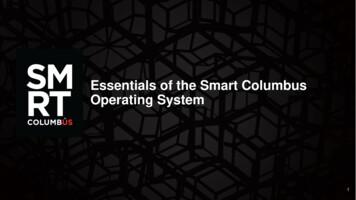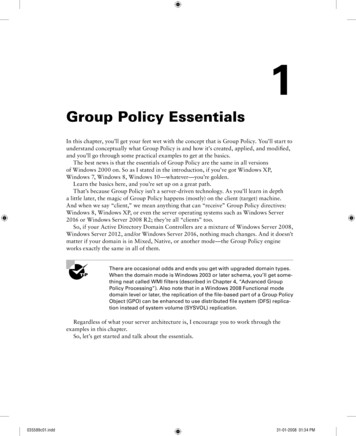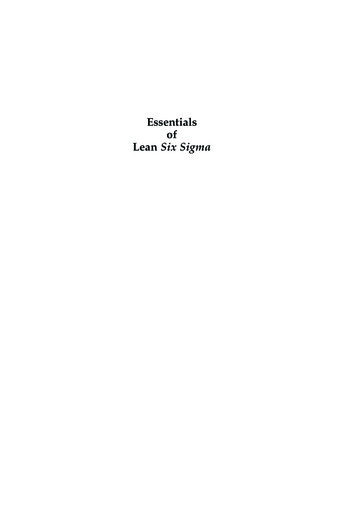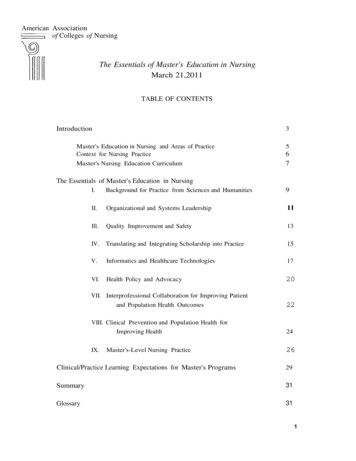
Transcription
American Associationof Colleges of NursingThe Essentials of Master's Education in NursingMarch 21,2011TABLE OF CONTENTSIntroduction3Master's Education in Nursing and Areas of PracticeContext for Nursing PracticeMaster's Nursing Education Curriculum567The Essentials of Master's Education in NursingI.Background for Practice from Sciences and Humanities9II.Organizational and Systems LeadershipIIIll.Quality Improvement and Safety13IV.Translating and Integrating Scholarship into Practice15V.Informatics and Healthcare Technologies17VI.Health Policy and Advocacy20VII. Interprofessional Collaboration for Improving Patientand Population Health Outcomes22VIII. Clinical Prevention and Population Health forImproving Health24IX.26Master's-Level Nursing PracticeClinical/Practice Learning Expectations for Master's Programs29Summary31Glossary311
References40Appendix A: Task Force on the Essentials of Master's Education in Nursing49Appendix B: Participants who attended Stakeholder Meetings50Appendix C: Schools of Nursing that Participated in the Regional Meetingsor Provided Feedback52Appendix D: Professional Organizations that Participated in the RegionalMeetings or Provided Feedback63Appendix E: Healthcare Systems that Participated in the Regional Meetings642
The Essentials of Master's Education in NursingMarch 21, 2011The Essentials of Master's Education in Nursing reflect the profession's continuing call forimagination, transformative thinking, and evolutionmy change in graduate education. Theextraordinmy explosion of knowledge, expanding technologies, increasing diversity, and globalhealth challenges produce a dynamic environment for nursing and amplify nursing's criticalcontributions to health care. Master's education prepares nurses for flexible leadership and criticalaction within complex, changing systems, including health, educational, and organizationalsystems. Master's education equips nurses with valuable knowledge and skills to lead change,promote health, and elevate care in various roles and settings. Synergy with these Essentials,current and future healthcare reform legislation, and the action-oriented recommendations of theInitiative on the Future of Nursing (!OM, 2010) highlights the value and transforming potential ofthe nursing profession.These Essentials are core for all master's programs in nursing and provide the necessarycurricular elements and framework, regardless of focus, major, or intended practice setting. TheseEssentials delineate the outcomes expected of all graduates of master's nursing programs. TheseEssentials are not prescriptive directives on the design of programs. Consistent with theBaccalaureate and Doctorate of Nursing Practice Essentials, this document does not addresspreparation for specific roles, which may change and emerge over time. These Essentials alsoprovide guidance for master's programs during a time when preparation for specialty advancednursing practice is transitioning to the doctoral level.Master's education remains a critical component of the nursing education trajectory to preparenurses who can address the gaps resulting from growing healthcare needs. Nurses who obtain thecompetencies outlined in these Essentials have significant value for current and emerging roles inhealthcare delivety and design through advanced nursing knowledge and higher level leadershipskills for improving health outcomes. For some nurses, master's education equips them with afulfilling lifetime expression of their mastery area. For others, this core is a graduate foundationfor doctoral education. Each preparation is valued.IntroductionThe dynamic nature of the healthcare delivery system underscores the need for thenursing profession to look to the future and anticipate the healthcare needs for whichnurses must be prepared to address. The complexities of health and nursing care todaymake expanded nursing knowledge a necessity in contemporary care settings. Thetransformation of health care and nursing practice requires a new conceptualization ofmaster's education. Master's education must prepare the graduate to: Lead change to improve quality outcomes,3
Advance a culture of excellence through lifelong learning, Build and lead collaborative interprofessional care teams, Navigate and integrate care services across the healthcare system, Design innovative nursing practices, and Translate evidence into practice.Graduates of master's degree programs in nursing are prepared with broad knowledge andpractice expertise that builds and expands on baccalaureate or entry-level nursing practice.This preparation provides graduates with a fuller understanding of the discipline ofnursing in order to engage in higher level practice and leadership in a variety of settingsand commit to lifelong learning. For those nurses seeking a terminal degree, the highestlevel of preparation within the discipline, the new conceptualization for master'seducation will allow for seamless movement into a research or practice-focused doctoralprogram (AACN, 2006, 2010).The nine Essentials addressed in this document delineate the knowledge and skills that allnurses prepared in master's nursing programs acquire. These Essentials guide thepreparation of graduates for diverse areas of practice in any healthcare setting. Essential I: Background for Practice from Sciences and Humanitieso Recognizes that the master's-prepared nurse integrates scientific findingsfrom nursing, biopsychosocial fields, genetics, public health, qualityimprovement, and organizational sciences for the continual improvementof nursing care across diverse settings. Essential II: Organizational and Systems Leadershipo Recognizes that organizational and systems leadership are critical to thepromotion of high quality and safe patient care. Leadership skills areneeded that emphasize ethical and critical decision making, effectiveworking relationships, and a systems-perspective. Essential III: Quality Improvement and Safetyo Recognizes that a master's-prepared nurse must be a11iculate in themethods, tools, performance measures, and standards related to quality, aswell as prepared to apply quality principles within an organization. Essential IV: Translating and Integrating Scholarship into Practiceo Recognizes that the master's-prepared nurse applies research outcomeswithin the practice setting, resolves practice problems, works as a changeagent, and disseminates results. Essential V: Informatics and Healthcare Technologies4
o Recognizes that the master's-prepared nurse uses patient-care technologiesto deliver and enhance care and uses communication technologies tointegrate and coordinate care.Essential VI: Health Policy and Advocacyo Recognizes that the master's-prepared nurse is able to intervene at thesystem level through the policy development process and to employadvocacy strategies to influence health and health care.Essential VII: Interprofessional Collaboration for Improving Patient andPopulation Health Outcomeso Recognizes that the master's-prepared nurse, as a member and leader ofinterprofessional teams, communicates, collaborates, and consults withother health professionals to manage and coordinate care.Essential VIII: Clinical Prevention and Population Health for ImprovingHealtho Recognizes that the master's-prepared nurse applies and integrates broad,organizational, client-centered, and culturally appropriate concepts in theplanning, delivety, management, and evaluation of evidence-based clinicalprevention and population care and services to individuals, families, andaggregates/identified populations.Essential IX: Master's-Level Nursing Practiceo Recognizes that nursing practice, at the master's level, is broadly definedas any form of nursing intervention that influences healthcare outcomesfor individuals, populations, or systems. Master's-level nursing graduatesmust have an advanced level of understanding of nursing and relevantsciences as well as the ability to integrate this knowledge into practice.Nursing practice interventions include both direct and indirect carecomponents.Master's Education in Nursing and Areas of PracticeGraduates with a master's degree in nursing are prepared for a variety of roles and areasof practice. Graduates may pursue new and innovative roles that result from healthreform and changes in an evolving and global healthcare system. Some graduates willpursue direct care practice roles in a variety of settings (e.g., the Clinical Nurse Leader,nurse educator). Others may choose indirect care roles or areas of practice that focus onaggregate, systems, or have an organizational focus, (e.g. nursing or health programmanagement, informatics, public health, or clinical research coordinator). In addition todeveloping competence in the nine Essential core areas delineated in this document, eachgraduate will have additional coursework in an area of practice or functional role. Thiscoursework may include more in-depth preparation and competence in one or two of theEssentials or in an additional/ supplementary area of practice.For example, more concentrated coursework or further development of the knowledge andskills embedded in Essential IV (Translational Scholarship for Evidence-Based Practice)will prepare the nurse to manage research projects for nurse scientists and other5
healthcare researchers working in multi-professional research teams. More in-depthpreparation in Essential II (Organizational and System Leadership) will provideknowledge useful for nursing management roles.In some instances, graduates of master's in nursing programs will seek to fill roles aseducators. As outlined in Essential IX, all master's-prepared nurses will developcompetence in applying teaching/learning principles in work with patients and/or studentsacross the continuum of care in a variety of settings. However, as recommended in theCarnegie Foundation report (2009), Educating Nurses: A Call for RadicalTransformation, those individuals, as do all master's graduates, who choose a nurseeducator role require preparation across all nine Essential areas, including graduate-levelclinical practice content and experiences. In addition, a program preparing individuals for anurse educator role should include preparation in curriculum design and development,teaching methodologies, educational needs assessment, and learner-centered theories andmethods. Master's prepared nurses may teach patients and their families and/or studentnurses, staff nurses, and variety of direct-care providers. The master's prepared nurseeducator differs from the BSN nurse in depth of his/her understanding of the nursingdiscipline, nursing practice, and the added pedagogical skills. To teach students, patients,and caregivers regarding health promotion, disease prevention, or disease management, themaster's-prepared nurse educator builds on baccalaureate knowledge with graduate- levelcontent in the areas of health assessment, physiology/pathophysiology, and pharmacologyto strengthen his/her scientific background and facilitate his/her understanding of nursingand health-related information. Those master's students who aspire to faculty roles inbaccalaureate and higher degree programs will be advised that additional education at thedoctoral level is needed (AACN, 2008).Context for Nursing PracticeHealth care in the United States and globally is changing dramatically. Interest in evolvinghealth care has prompted greater focus on health promotion and illness prevention, alongwith cost-effective approaches to high acuity, chronic disease management, carecoordination, and long-term care. Public concerns about cost of health care, fiscalsustainability, healthcare quality, and development of sustainable solutions to healthcareproblems are driving reform efforts. Attention to affordability and accessibility of healthcare, maintaining healthy environments, and promoting personal andcommunity responsibility for health is growing among the public and policy makers.In addition to broad public mandates for a reformed and responsive healthcare system, anumber of groups are calling for changes in the ways all health professionals are educatedto meet current and projected needs for contemporary care delive1y. The Institute of6
Medicine (IOM), an interprofessional healthcare panel, described a set of corecompetencies that all health professionals regardless of discipline will demonstrate: I) theprovision of patient-centered care, 2) working in interprofessional teams, 3) employingevidence-based practice, 4) applying quality improvement approaches, and 5) utilizinginformatics (!OM, 2003).Given the ongoing public trust in nursing (Gallup, 20 I 0), and the desire for fundamentalreorganization of relationships among individuals, the public, healthcare organizationsand healthcare professionals, graduate education for nurses is needed that is wide inscope and breadth, emphasizes all systems-level care and includes maste1y of practiceknowledge and skills. Such preparation reflects mastery of higher level thinking andconceptualization skills than at the baccalaureate level, as well as an understanding of theinterrelationships among practice, ethical, and legal issues; financial concerns andcomparative effectiveness; and interprofessional teamwork.Master's Nursing Education CurriculumThe master's nursing curriculum is conceptualized in Figure I and includes threecomponents:I. Graduate Nursing Core: foundational curriculum content deemed essentialfor all students who pursue a master's degree in nursing regardless of thefunctional focus.2. Direct Care Core: essential content to provide direct patient services at anadvanced level.3. Functional Area Content: those clinical and didactic learning experiencesidentified and defined by the professional nursing organizations andcertification bodies for specific nursing roles or functions.This document delineates the graduate nursing core competencies for all master'sgraduates. These core outcomes reflect the many changes in the healthcare systemoccurring over the past decade. In addition, these expected outcomes for all master'sdegree graduates reflect the increasing responsibility of nursing in addressing many of thegaps in health care as well as growing patient and population needs.Master's nursing education, as is all nursing education, is evolving to meet these needsand to prepare nurses to assume increasing accountabilities, responsibilities, andleadership positions. As master's nursing education is re-envisioned and preparation ofindividuals for advanced specialty nursing practice transitions to the practice doctoratethese Essentials delineate the foundational, core expectations for these master's programgraduates until the transition is completed.7
Figure 1: Model of Master's Nursing CurriculumMaster's Graduate Nursing Core(all master's degree nursing students)jIIIIIICompetencies for indirect care practiceroles (those that pnmarily focus onaggregates, systems, and organizations)Direct care core*(3 P's)I/ Competencies for direct care roles ''Didactic and supervised practice experiences to demonstrate integrationof advanced nursing knowledge in one's master's level nursing practice*All master's degree programs that prepare graduates for roles that have a component ofdirect care practice are required to have graduate level content/coursework in thefollowing three areas: physiology/pathophysiology, health assessment, and pharmacology.However, graduates being prepared for any one of the four APRN roles (CRNA, CNM,CNS, or CNP), must complete three separate comprehensive, graduate level courses thatmeet the criteria delineated in the 2008 Consensus Mode/for APRN Licensure,Accreditation, Certification and PRNReport.pdf). In addition, the expectedoutcomes for each of these three APRN core courses are delineated in The Essentials ofDoctoral Education for Advanced Nursing Practice (pg. 23-24)(www.aacn.nchc.edu/dnp/Essentials.pdf). The nursing educator is a direct care role and therefore requires graduate-level contentin the three Direct Care Core courses. All graduates of a master's nursing program musthave supervised practice experiences that are sufficient to demonstrate mastery of theEssentials. The term "supervised" is used broadly and can include precepted experienceswith faculty site visits. These learning experiences may be accomplished through diverseteaching methods, including face-to-face or simulated methods.In addition, development of clinical proficiency is facilitated through the use of focusedand sustained clinical experiences designed to strengthen patient care delivery skills, as8
well as system assessment and intervention skills, which will lead to an enhancedunderstanding of organizational dynamics. These immersion experiences afford thestudent an opportunity to focus on a population of interest or may focus on a specificrole. Most often, the immersion experience occurs toward the end of the program as aculminating synthesis experience.The Essentials of Master's Education in NursingEssential 1: Background for Practice from Sciences and HumanitiesRationaleMaster's-prepared nurses build on the competencies gained in a baccalaureate nursingprogram by developing a deeper understanding of nursing and the related sciences neededto fully analyze, design, implement, and evaluate nursing care. These nurses are wellprepared to provide care to diverse populations and cohorts of patients in clinical andcommunity-based systems. The master's-prepared nurse integrates findings from thesciences and the humanities, biopsychosocial fields, genetics, public health, qualityimprovement, health economics, translational science, and organizational sciences for thecontinual improvement of nursing care at the unit, clinic, home, or program level.Master's-prepared nursing care reflects a more sophisticated understanding ofassessment, problem identification, design of inte1ventions, and evaluation of aggregateoutcomes than baccalaureate-prepared nursing care.Students being prepared for direct care roles will have graduate-level content that buildsupon an undergraduate foundation in health assessment, pharmacology, andpathophysiology. Having master's-prepared graduates with a strong background in thesethree areas is seen as imperative from the practice perspective. It is recommended that themaster's curriculum preparing individuals for direct care roles include three separategraduate-level courses in these three content areas. In addition, the inclusion ofthesethree separate courses facilitates the transition of these master's program graduates intothe DNP advanced-practice registered-nurse programs.Master's-prepared nurses understand the intersection between systems science andorganizational science in order to serve as integrators within and across systems of care.Care coordination is based on systems science (Nelson et al., 2008). Care managementincorporates an understanding of the clinical and community context, and the researchrelevant to the needs of the population. Nurses at this level use advanced clinicalreasoning for ambiguous and uncertain clinical presentations, and incorporate concerns offamily, significant others, and communities into the design and delivery of care.Master's-prepared nurses use a variety of theories and frameworks, including nursing andethical theories in the analysis of clinical problems, illness prevention, and healthpromotion strategies. Knowledge from information sciences, health communication, andhealth literacy are used to provide care to multiple populations. These nurses are able to9
address complex cultural issues and design care that responds to the needs of multiplepopulations, who may have potentially conflicting cultural needs and preferences. Ashealthcare technology becomes more sophisticated and its use more widespread,master's-prepared nurse are able
Mar 21, 2011 · The master's nursing curriculum is conceptualized in Figure I and includes three components: I. Graduate Nursing Core: foundational curriculum content deemed essential for all students who pursue a master's degree in nursing regardless of the functional focus. 2. Direct Care Core: e
